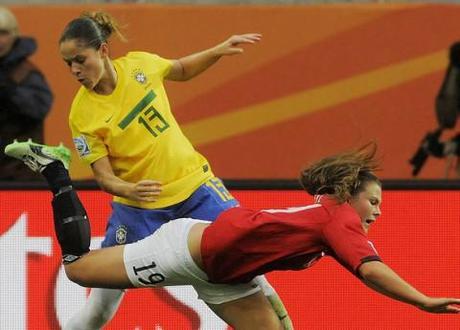
Women's World Cup 2011. Photo credit: americanistadechiapas, http://flic.kr/p/a2d9NY
The women’s football World Cup final saw Japan triumph over tournament favourites USA 3-1 on penalties. However, it seems the real winner is women’s football itself: the match on 18 July 2011 was the most tweeted event in Twitter’s history, beating the men’s football World Cup final, the Royal Wedding and even Justin Bieber. This may be due in part to the increase in Twitter users, but the statistic is still impressive, particularly in the UK, where the words “women” and “football” are more commonly conjoined to mean WAGs.
“Between themselves, the British press pack in Germany dubbed the tournament ‘the grown-up world cup’.” The Guardian.
- Why was the World Cup such a success? Writing in The Guardian, Rachel Dixon said that the British press referred to the women’s tournament as “the grown-up world cup“: “The lack of dissent and theatrics was refreshing. Women’s football is constantly compared to the men’s game and found lacking, but in this respect it leads the way,” she said. Dixon also pointed to the level of play: “The standard of football was higher than ever and the games were more competitive. The 2007 tournament, for example, started with an 11-0 win for Germany over Argentina, and there have been 7-0 quarter-finals in the past – a far cry from this year’s largely tense ties.”
- The greatest show that (almost) never was. In Germany, the host nation, the opening match was watched by 18 million viewers. However, the BBC originally intended to show the England team’s quarter-final with France online and on its interactive services only. Pressure from ministers and viewer demand led to a rethink, and the match was screened live on BBC2. In the event, England lost to France on penalties; their coach, Hope Powell, complained about the team’s “cowardice” after several players apparently refused to step up, leading to calls for her to quit.
Men’s World Cup prize fund 2010: $420 million; Women’s World Cup winners’ prize fund 2011: $7.6 million. Source: The Times.
- Opening debate. As well as providing an international platform for women’s football, the World Cup has reopened the debate surrounding female participation in the game. Despite being seen as “the home of football”, the UK seems to lag behind other nation in women’s football. “In the UK, girls are not allowed to play with boys past the age of 12. Apparently, this is for obscure health and safety reasons that somehow don’t affect the boys or girls of many other countries. The upshot is that they have nowhere to play and consequently end up playing netball. Or cheerleading, the fastest-growing sport in England,” said Stefanie Marsh in The Times. Marsh pointed to the disparity between women’s and men’s salaries in English football: “Last year the FA introduced central contracts, which delighted the girls, but they still amount to only £16,000 a year.” The average annual salary of a male footballer in the English Premier League was £1.46 million in 2010, according to a review by Sporting Intelligence. However, the picture for female football is not all bad: in April 2011, English Football Association introduced its first women’s semi-professional league. Nevertheless, the US is still seen as the premium destination for female footballers (or, rather, “soccer players”): five members of the England team currently play for American teams.
- Selling sex? Ahead of the tournament, members of the French and German sides stripped off for sexy photoshoots. Yasmin El-Sharif speculated in Der Spiegel that the increased interest from German advertisers in the Women’s World Cup may be down to “sexualised marketing”: “Much of the interest could be due to the fact that this year’s World Cup is taking place in Germany. But Daniela Schaaf, an expert on women’s football at the German Sport University Cologne, has a different theory: ‘It’s the new image of female footballers,’ she says. ‘The players are now seen as sexy and that sexy image is pushed. They are no longer perceived as manly women.’” El-Sharif suggested a better long-term strategy would be to “replace the players’ sexy image with a sportier one”. But not everyone would agree: Sepp Blatter, everyone’s favourite FIFA president, suggested a few years ago that female footballers should consider wearing “tighter shorts” to encourage the popularity of the game. Just before this year’s tournament, FIFA banned the Iranian women’s team from the 2012 Olympics because their hijabs apparently do not meet the football body’s uniform regulations.
More on sport
- Blatter denies football is in crisis
- Ryan Giggs unmasked
- Stop with the grunting at Wimbledon

